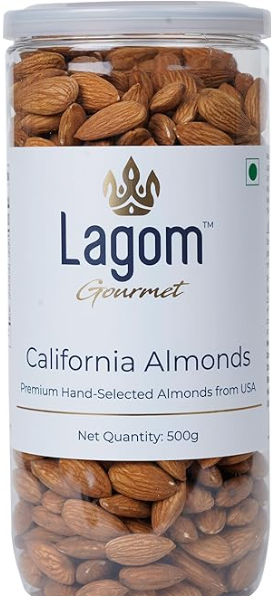
Meta Description
Introduction
Nuts have long been celebrated as nutrient-dense foods that provide energy, satiety, and a wealth of health benefits. Among the most popular choices, walnuts and almonds often take the spotlight. While both are packed with essential nutrients, their nutritional profiles differ in subtle but significant ways. By comparing walnuts’ vs almonds’ nutrition facts, you can understand which nut is better suited for brain health, weight management, heart wellness, or simply your daily snack routine.
Calories and Energy Content
When it comes to calorie content, both walnuts and almonds are energy-dense foods, making them excellent options for quick snacks.
Walnuts: A one-ounce serving (about 28 grams or 14 halves) provides roughly 185 calories.
Almonds: The same serving size (about 23 whole almonds) contains around 160 calories.
While the difference may seem small, almonds are slightly lower in calories, which could make them more appealing for those who are watching their energy intake. However, walnuts deliver more omega-3 fatty acids, which justifies their higher calorie count.
Personal views
I give my daughter soaked almonds every morning because I feel they keep her mind sharp and active. Walnuts are also very good, as they support memory and brain growth. These simple natural foods help in keeping children healthy and smart.
Protein Content
Protein is vital for building and repairing tissues, supporting muscle growth, and keeping you full.
Walnuts: About 4.3 grams of protein per ounce.
Almonds: Nearly 6 grams of protein per ounce.
Clearly, almonds provide more protein, making them a better choice for individuals focusing on muscle development, high-protein diets, or plant-based protein sources.
Healthy Fats
Both nuts are high in fats, but not all fats are created equal. The type of fat present in each nut greatly influences its health benefits.
Walnuts: Each ounce has approximately 18.5 grams of fat, of which 13 grams are polyunsaturated. They are one of the richest plant sources of alpha-linolenic acid (ALA), an omega-3 fatty acid linked to heart and brain health.
Almonds: Each ounce offers roughly 14 grams of fat, including around 9 grams of heart-healthy monounsaturated fats. Monounsaturated fats are excellent for lowering bad cholesterol and supporting heart wellness.
In short, walnuts are better for omega-3 intake, while almonds excel in monounsaturated fat content.

Carbohydrates and Fiber
Fiber plays an important role in digestion, blood sugar control, and weight management.
Walnuts: Provides about 3.9 grams of carbs and 2 grams of fiber in each ounce.
Almonds: Contains around 6 grams of carbs and 3.5 grams of dietary fiber in every ounce.
This makes almonds a more fiber-rich option, helpful for digestive health and long-lasting satiety.
Expert View:
According to Dr. Ruchi Sinha, Pediatric Nutritionist, soaked almonds and walnuts are among the best brain foods for children. Almonds are rich in vitamin E and healthy fats that support concentration and memory, while walnuts contain omega-3 fatty acids that help in overall brain development. Giving children a few soaked almonds and walnuts daily can naturally boost their learning ability and focus.
Vitamins and Minerals
Both walnuts vs almonds are nutritional powerhouses, but their vitamin and mineral profiles vary.
Walnuts: Rich in magnesium, copper, manganese, and phosphorus. They also provide vitamin B6 and folate, both essential for brain function.
Almonds: Rich in vitamin E, magnesium, riboflavin, and calcium, with vitamin E acting as a strong antioxidant that supports healthy skin, vision, and heart function.
If you are looking for vitamin E and calcium, almonds take the lead. For brain-supporting nutrients like folate and copper, walnuts shine.
Antioxidants and Phytochemicals
Antioxidants protect the body from oxidative stress, which contributes to aging and chronic diseases.
Walnuts: Walnuts are packed with polyphenols, ellagic acid, and potent antioxidants mainly found in their delicate skin, and research reveals they rank among the top nuts for antioxidant content.
Almonds: Also contain polyphenols and flavonoids, but they are especially strong in vitamin E, a fat-soluble antioxidant that protects cell membranes.
Both nuts are excellent sources, but walnuts rank slightly higher in total antioxidant activity.
Heart Health Benefits
Nuts are well known for their heart-protective properties.
Walnuts: Their omega-3 fatty acids reduce inflammation, lower blood pressure, and improve cholesterol balance by increasing HDL (good cholesterol) and lowering LDL (bad cholesterol).
Almonds: Their monounsaturated fats and vitamin E contribute to better arterial health and reduced risk of cardiovascular disease.
For anti-inflammatory heart protection, walnuts are exceptional. For cholesterol and arterial support, almonds provide strong benefits.

Brain Health and Cognitive Function
Brain health is one of the standout benefits of walnuts.
Walnuts:High in omega-3s and polyphenols, walnuts support memory, learning, and overall brain function. Research suggests they may even reduce the risk of neurodegenerative conditions like Alzheimer’s disease.
Almonds: While not as rich in omega-3s, almonds offer riboflavin and L-carnitine, compounds linked to better neurological health and memory support.
If brain health is your priority, walnuts come out ahead.
Weight Management
Weight control depends on balancing calorie intake with satiety and metabolism.
Walnuts: Their omega-3s may boost metabolism and reduce appetite, making them helpful for weight management despite higher calories.
Almonds: Their fiber and protein keep you full longer and reduce cravings, which helps with portion control.
Both support weight control, though almonds have a small advantage thanks to their greater protein and fiber levels

Skin and Hair Benefits
Nuts are also a beauty food, promoting healthy skin and strong hair.
Walnuts: Omega-3s and antioxidants fight skin inflammation, support collagen production, and promote scalp health.
Almonds: Vitamin E protects the skin from sun damage, reduces dryness, and keeps hair shiny and nourished.
For glowing skin, almonds are outstanding, while walnuts are excellent for reducing inflammation-related skin issues.
Suitability for Special Diets
For Vegans and Vegetarians: Both nuts are ideal plant-based protein and fat sources.
For Keto Dieters: Almonds have fewer carbs per ounce, making them slightly more keto-friendly.
For Diabetics: Almonds, with their fiber and lower glycemic index, are better for controlling blood sugar spikes.
Potential Drawbacks
Though highly nutritious, there are a few considerations:
Walnuts: Higher in calories and can go rancid faster due to their high polyunsaturated fat content.
Almonds: Contain oxalates, which may contribute to kidney stone formation if eaten in excess.
Moderation is key for both.

Practical Uses in Daily Diet
Walnuts: Perfect in oatmeal, salads, and baked goods. Their rich, nutty taste pairs beautifully with both savory and sweet recipes.
Almonds: Great as snacks, in almond milk or nut butter, or sprinkled over yogurt and smoothies. Their subtle flavor makes them versatile.
Final Verdict: Walnuts vs Almonds
When analyzing walnuts vs almonds nutrition facts, both nuts stand out as nutritional champions, but they shine in different areas:
Choose walnuts if you want more omega-3s, brain health support, and antioxidant power.
Choose almonds if you’re after higher protein, fiber, vitamin E, and better blood sugar control.
The smartest approach? Incorporate both into your diet in balanced amounts. Together, they provide a broader spectrum of nutrients and health benefits.
Conclusion
Walnuts and almonds aren’t competitors—they are powerful, complementary superfoods. By understanding the walnuts vs. almonds nutrition facts, you can make informed choices depending on your health goals. Whether you want to boost brain function, support your heart, manage weight, or maintain glowing skin, these nuts can play an essential role in your wellness journey
FAQs
Which is healthier, walnuts or almonds?
Walnuts are richer in omega-3s, while almonds have more protein and vitamin E.
Are walnuts better for brain health?
Indeed, the omega-3s in walnuts help enhance memory and improve concentration.
Which nut is best for skin health?
Almonds, due to their vitamin E content, are ideal for glowing skin.
Do almonds have more protein than walnuts?
Yes, almonds provide about 6 g per ounce, compared to 4.3 g in walnuts.
Which is better for weight loss?
Almonds are higher in fiber and protein, making them slightly better for weight control.
